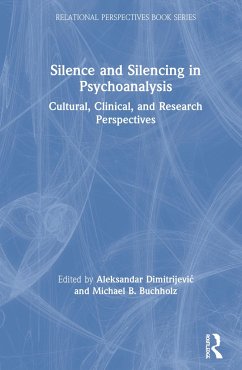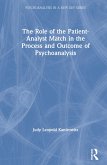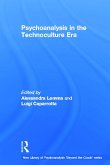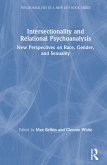Silence and Silencing in Psychoanalysis
Cultural, Clinical, and Research Perspectives
Herausgeber: Dimitrijevic, Aleksandar; Buchholz, Michael B
Silence and Silencing in Psychoanalysis
Cultural, Clinical, and Research Perspectives
Herausgeber: Dimitrijevic, Aleksandar; Buchholz, Michael B
- Gebundenes Buch
- Merkliste
- Auf die Merkliste
- Bewerten Bewerten
- Teilen
- Produkt teilen
- Produkterinnerung
- Produkterinnerung
This book is the first comprehensive treatment in recent decades of silence and silencing in psychoanalysis from clinical and research perspectives, as well as in philosophy, theology, linguistics, and musicology.
Andere Kunden interessierten sich auch für
![The Role of the Patient-Analyst Match in the Process and Outcome of Psychoanalysis The Role of the Patient-Analyst Match in the Process and Outcome of Psychoanalysis]() Judy Leopold KantrowitzThe Role of the Patient-Analyst Match in the Process and Outcome of Psychoanalysis180,99 €
Judy Leopold KantrowitzThe Role of the Patient-Analyst Match in the Process and Outcome of Psychoanalysis180,99 €![Conundrums and Predicaments in Psychotherapy and Psychoanalysis Conundrums and Predicaments in Psychotherapy and Psychoanalysis]() Conundrums and Predicaments in Psychotherapy and Psychoanalysis180,99 €
Conundrums and Predicaments in Psychotherapy and Psychoanalysis180,99 €![Psychoanalysis in the Technoculture Era Psychoanalysis in the Technoculture Era]() Psychoanalysis in the Technoculture Era180,99 €
Psychoanalysis in the Technoculture Era180,99 €![Intersectionality and Relational Psychoanalysis Intersectionality and Relational Psychoanalysis]() Intersectionality and Relational Psychoanalysis180,99 €
Intersectionality and Relational Psychoanalysis180,99 €![Psychoanalysis and Aesthetics Psychoanalysis and Aesthetics]() Charles BaudouinPsychoanalysis and Aesthetics180,99 €
Charles BaudouinPsychoanalysis and Aesthetics180,99 €![The Independent Mind in British Psychoanalysis The Independent Mind in British Psychoanalysis]() Eric RaynerThe Independent Mind in British Psychoanalysis180,99 €
Eric RaynerThe Independent Mind in British Psychoanalysis180,99 €![For and Against Psychoanalysis For and Against Psychoanalysis]() Stephen FroshFor and Against Psychoanalysis159,99 €
Stephen FroshFor and Against Psychoanalysis159,99 €-
-
-
This book is the first comprehensive treatment in recent decades of silence and silencing in psychoanalysis from clinical and research perspectives, as well as in philosophy, theology, linguistics, and musicology.
Produktdetails
- Produktdetails
- Verlag: Taylor & Francis
- Seitenzahl: 386
- Erscheinungstermin: 17. November 2020
- Englisch
- Abmessung: 234mm x 156mm x 24mm
- Gewicht: 757g
- ISBN-13: 9780367367046
- ISBN-10: 0367367041
- Artikelnr.: 59987610
- Verlag: Taylor & Francis
- Seitenzahl: 386
- Erscheinungstermin: 17. November 2020
- Englisch
- Abmessung: 234mm x 156mm x 24mm
- Gewicht: 757g
- ISBN-13: 9780367367046
- ISBN-10: 0367367041
- Artikelnr.: 59987610
Michael B. Buchholz is professor of social psychology at International Psychoanalytic University (IPU), Berlin, Germany. He is a psychologist and social scientist and a fully trained psychoanalyst. He is head of the Doctorate Program at IPU and chair of the social psychological department. He has published more than 20 books and more than 350 scientific papers on topics like analysis of therapeutic metaphors and therapeutic conversation, including the supervisory process, and he has contributed to psychoanalytic treatment technique, theory, and history. Michael has conducted conversation analytic studies on group therapy with sexual offenders about therapeutic "contact scenarios," as well as on therapeutic empathy. His current interest is the study of therapeutic talk-in-interaction using Conversation Analysis. Aleksandar Dimitrijevi¿, PhD, is a clinical psychologist and psychoanalyst. He works as a lecturer at the International Psychoanalytic University and in private practice in Berlin. He has given lectures, seminars, university courses, and conference presentations throughout Europe and in the United States of America. He is author of many conceptual and empirical papers about attachment theory and research, psychoanalytic education, and psychoanalysis and the arts, some of which were translated into German, Hungarian, Italian, Slovenian, Spanish, and Turkish. He has also edited or co-edited ten other books or special journal issues, most recent of which is Ferenczi's Influence on Contemporary Psychoanalytic Traditions (with Gabriele Cassullo and Jay Frankel, 2018).
Section I - Cultural. Introduction to Section I 1.Silence in phenomenology:
dream or nightmare? 2.Encountering religious and spiritual silences 3.Forms
and Functions of Silence and Silencing. An Approach from Linguistics and
Conversation Analysis with Reference to Psychotherapy 4.The many forms of
silence in music 5.Silence in an Age of Distraction Section II - Clinical.
Introduction to Section II 6.Cultural function and psychological
transformation of silence in psychoanalysis and psychoanalytic
psychotherapy 7.Varieties of silence in the analytic setting 8.Silence as a
manifestation of resistance 9.Silence is Golden (Usually) 10.Winnicott's
Capacity for Silence in Understanding and Healing Human Nature 11.Silence
As A Condition For Analytic Listening. Site, Situation and Process
12.Silence and silencing of the traumatized Section III - Research.
Introduction to Section III 13.Measuring Silence. The Pausing Inventory
Categorization System and a Review of Findings 14.Pauses are Conversations.
What they tell us when we listen 15.How to move on after silences:
Addressing thought processes to restart conversation 16.The interaction
order of silent moments in everyday life: Lapses as joint embodied
achievements 17.Speaking that silences. A single case multi-method analysis
of a couple's interview. Concluding thoughts
dream or nightmare? 2.Encountering religious and spiritual silences 3.Forms
and Functions of Silence and Silencing. An Approach from Linguistics and
Conversation Analysis with Reference to Psychotherapy 4.The many forms of
silence in music 5.Silence in an Age of Distraction Section II - Clinical.
Introduction to Section II 6.Cultural function and psychological
transformation of silence in psychoanalysis and psychoanalytic
psychotherapy 7.Varieties of silence in the analytic setting 8.Silence as a
manifestation of resistance 9.Silence is Golden (Usually) 10.Winnicott's
Capacity for Silence in Understanding and Healing Human Nature 11.Silence
As A Condition For Analytic Listening. Site, Situation and Process
12.Silence and silencing of the traumatized Section III - Research.
Introduction to Section III 13.Measuring Silence. The Pausing Inventory
Categorization System and a Review of Findings 14.Pauses are Conversations.
What they tell us when we listen 15.How to move on after silences:
Addressing thought processes to restart conversation 16.The interaction
order of silent moments in everyday life: Lapses as joint embodied
achievements 17.Speaking that silences. A single case multi-method analysis
of a couple's interview. Concluding thoughts
Section I - Cultural. Introduction to Section I 1.Silence in phenomenology:
dream or nightmare? 2.Encountering religious and spiritual silences 3.Forms
and Functions of Silence and Silencing. An Approach from Linguistics and
Conversation Analysis with Reference to Psychotherapy 4.The many forms of
silence in music 5.Silence in an Age of Distraction Section II - Clinical.
Introduction to Section II 6.Cultural function and psychological
transformation of silence in psychoanalysis and psychoanalytic
psychotherapy 7.Varieties of silence in the analytic setting 8.Silence as a
manifestation of resistance 9.Silence is Golden (Usually) 10.Winnicott's
Capacity for Silence in Understanding and Healing Human Nature 11.Silence
As A Condition For Analytic Listening. Site, Situation and Process
12.Silence and silencing of the traumatized Section III - Research.
Introduction to Section III 13.Measuring Silence. The Pausing Inventory
Categorization System and a Review of Findings 14.Pauses are Conversations.
What they tell us when we listen 15.How to move on after silences:
Addressing thought processes to restart conversation 16.The interaction
order of silent moments in everyday life: Lapses as joint embodied
achievements 17.Speaking that silences. A single case multi-method analysis
of a couple's interview. Concluding thoughts
dream or nightmare? 2.Encountering religious and spiritual silences 3.Forms
and Functions of Silence and Silencing. An Approach from Linguistics and
Conversation Analysis with Reference to Psychotherapy 4.The many forms of
silence in music 5.Silence in an Age of Distraction Section II - Clinical.
Introduction to Section II 6.Cultural function and psychological
transformation of silence in psychoanalysis and psychoanalytic
psychotherapy 7.Varieties of silence in the analytic setting 8.Silence as a
manifestation of resistance 9.Silence is Golden (Usually) 10.Winnicott's
Capacity for Silence in Understanding and Healing Human Nature 11.Silence
As A Condition For Analytic Listening. Site, Situation and Process
12.Silence and silencing of the traumatized Section III - Research.
Introduction to Section III 13.Measuring Silence. The Pausing Inventory
Categorization System and a Review of Findings 14.Pauses are Conversations.
What they tell us when we listen 15.How to move on after silences:
Addressing thought processes to restart conversation 16.The interaction
order of silent moments in everyday life: Lapses as joint embodied
achievements 17.Speaking that silences. A single case multi-method analysis
of a couple's interview. Concluding thoughts








